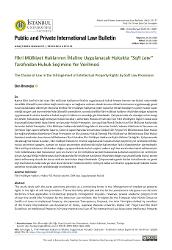| dc.contributor.author | Omeroglu, Ekin | |
| dc.date.accessioned | 2023-10-19T15:11:58Z | |
| dc.date.available | 2023-10-19T15:11:58Z | |
| dc.date.issued | 2020 | |
| dc.identifier.issn | 2651-5377 | |
| dc.identifier.issn | 2667-4114 | |
| dc.identifier.uri | https://doi.org/10.26650/ppil.2020.40.1.0001 | |
| dc.identifier.uri | 396239 | |
| dc.identifier.uri | https://hdl.handle.net/20.500.12469/5296 | |
| dc.description.abstract | This study deals with the party autonomy principle as a connecting factor in the infringement of intellectual property rights in the light of soft law provisions. The territoriality principle and the lex loci protectionis rule govern as the main doctrines of law applicable to intellectual property infringement disputes. However, several academic projects from all over the world (the Principles by the American Law Institute, the Principles by the European Max Planck Group on Conflict of Laws in Intellectual Property, the Japanese Transparency Proposal, the Joint Principles drafted by members of the Private International Law Association of Korea, Japanese Waseda University Global COE Project and the Draft Guidelines on Intellectual Property in Private International Law of The International Law Association Intellectual Property and Private International Law Committee) suggested the party autonomy principle for the infringement of intellectual property rights in contrast to Article 8(3) of the Rome II Regulation. All these principles have no legally binding effect, but they are a set of principles that could be used both by international and national legislative bodies and courts. Moreover, the party autonomy principle in intellectual property infringement cases has been accepted by Turkish Private International Law Act (PILA), Swiss PILA and Chinese PILA. The purpose of this study is to analyse both soft law and national law provisions comparatively. Although the common aspect of the legal principles is to accept the will of the party, all of the provisions differ in several aspects. This study attempts to analyse and evaluate the suggested developments of the choice of law for intellectual property infringement cases. | en_US |
| dc.language.iso | tur | en_US |
| dc.publisher | Istanbul Univ | en_US |
| dc.relation.ispartof | Public and Private International Law Bulletin | en_US |
| dc.rights | info:eu-repo/semantics/openAccess | en_US |
| dc.subject | Intellectual property rights | en_US |
| dc.subject | Torts | en_US |
| dc.subject | Choice of law | en_US |
| dc.subject | Soft law | en_US |
| dc.subject | Applicable law | en_US |
| dc.title | The Choice of Law in the Infringement of Intellectual Property Rights by Soft Law Provisions | en_US |
| dc.type | article | en_US |
| dc.identifier.startpage | 55 | en_US |
| dc.identifier.endpage | 77 | en_US |
| dc.identifier.issue | 1 | en_US |
| dc.identifier.volume | 40 | en_US |
| dc.department | N/A | en_US |
| dc.identifier.wos | WOS:000799111800003 | en_US |
| dc.identifier.doi | 10.26650/ppil.2020.40.1.0001 | en_US |
| dc.institutionauthor | Omeroglu, Ekin | |
| dc.relation.publicationcategory | Makale - Uluslararası Hakemli Dergi - Kurum Öğretim Elemanı | en_US |
| dc.identifier.trdizinid | https://search.trdizin.gov.tr/yayin/detay/396239 | en_US |
| dc.khas | 20231019-WoS | en_US |
















